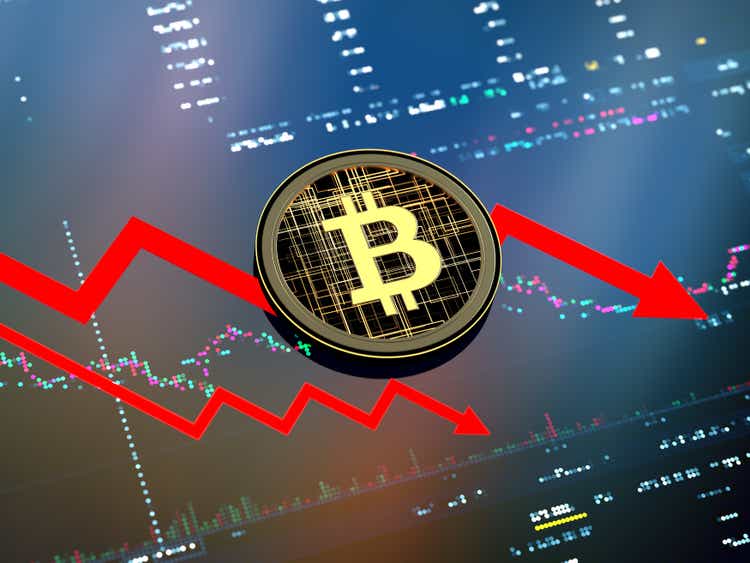FTX downfall could extend crypto bear market through end-2023: Coinbase
Vertigo3d/iStock via Getty Images
Just as the cryptocurrency market started to see “an emerging positive setup” after substantial deleveraging in May and June left few marginal sellers in the ecosystem, the space suffered another blow as the once-mighty crypto exchange FTX collapsed. The rapid fall of FTX will potentially extend the crypto bear market by several more months, or perhaps through the end of 2023, according to a recent research report by Coinbase Global (COIN).
Sam Bankman-Fried’s FTX, which was once the world’s second-largest crypto exchange by trading volume and valued to the tune of $32B, filed for Chapter 11 bankruptcy protection in the U.S. last week following the discovery of its $8B balance sheet shortfall, among other missteps like misjudging users’ margin, that resulted in a colossal amount of outflows. The week-long meltdown has escalated into growing concerns of potential systemic risk and left the sector vulnerable amid a shortage in large buyers, Coinbase said.
While FTX’s bankruptcy proceedings will be closely monitored, Coinbase noted that the direction of the crypto asset class will also depend on how the Federal Reserve’s interest-rate policy plays out. But with inflation still at extraordinarily high levels and the labor market staying tight, “it’s still too early for a Fed pivot,” the centralized crypto exchange contended.
Nevertheless, current efforts to make exchanges more transparent (proof of reserves), regulatory collaboration, and assisting investigators to recoup any missing customer funds “are the important steps to take and will have a greater impact on the market than certain macroeconomic factors,” Vincenzo Toppi, partner in the CohnReznick Advisory Restructuring and Dispute Resolution Practice, told Seeking Alpha via email.
Coinbase said it expects the crypto space to see “second order effects” come to light from the unraveling of FTX, “as it emerges which counterparties may have lent or interacted with either FTX or Alameda and what those exact liabilities are.” Keep in mind that Alameda Research was SBF’s quantitative trading firm that played a key role in the demise of the 30-year-old’s crypto empire.
Bradley Duke, founder and CEO at ETC Group, agrees with Coinbase’s assessment, saying “there is little doubt that the FTX collapse will delay the crypto spring,” adding “investor confidence in crypto has taken a severe knock and the aftershocks from this event will continue to be felt for some time.”
The Brian Armstrong-led firm also reckons that poor liquidity conditions could last through at least the end of 2022, as the dominance of stablecoins (digital tokens whose value is tied to another asset like the U.S. dollar) continues to take more share of the deteriorating crypto market cap, now standing at 18% versus around 5% in October 2021.
Elsewhere in the cryptoverse, the bitcoin (BTC-USD) mining landscape has been undergoing pain, well before the fall of FTX, as a rise in the network hashrate and energy costs along with depressed BTC prices squeeze miner’s profitability. That being said, a number of BTC miners have disclosed liquidity issues in recent weeks, including Core Scientific (CORZ), Argo Blockchain (ARBK) (OTCQX:ARBKF) and Iris Energy (IREN). The FTX debacle has certainly hurt investor confidence in the space, in a move that could result in further harm in token prices and thus could add pressure to miner’s margins.
The price of bitcoin (BTC-USD), meanwhile, has dropped around 20% since the FTX mess started over a week ago, trading at $16.58K as of Friday afternoon. Looking forward, “the capitulation in BTC will depend on the scale of FTX contagion,” Khaleelulla Baig, founder and CEO of KoinBasket, told Seeking Alpha.
Baig sees bitcoin’s (BTC-USD) “worst case scenario” at potentially sub-$10K levels, noting “short-term implications are clearly negative while the long-term perspective looks intact. The FTX fiasco has pushed back the entire ecosystem by at least a couple of years.”
Previously, (Nov. 17) John Ray III, the new FTX boss, condemned the exchange under SBF’s leadership, calling its poor management practices worse than Enron’s.


